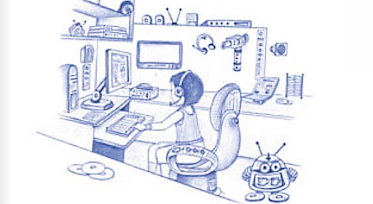Online AI Schools Launched in the USA – Redefining Education
Imagine if Isaac Asimov's idea from "The Fun
They Had" became a reality where kids who are used to computer screens and
online education were astonished to see a genuine book and amazed by its
existence. It's almost amazing to turn pages, feel the paper's texture, and
read words that don't move!
With the rise of AI-powered schools in the USA, Asimov's imagined future is closer than we could imagine. AI is taking the lead in providing individualized education at schools like Alpha School and Kūlia Academy, which are prime examples of the trend toward digital and personalized learning. Today's students might one day wonder about the sensory pleasures of traditional schools, just as the kids in Asimov's novel were mesmerized by the simplicity of printed books.
What Are AI Schools?
Advanced AI systems are used in AI schools to supplement or even replace conventional teaching techniques. AI schools use technology to:
• Create customized lesson plans for students based on their needs
• Automate administrative work; in contrast to traditional schools, where instructors manage all instructional and administrative responsibilities.
• Give students immediate feedback.
AI schools encourage educators to concentrate on mentorship and innovative facets of education rather than trying to replace them.
Let's take a look at the USA's renowned schools.
|
School |
Unique Feature |
|
Alpha School |
Uses AI to complete core academics in two
hours, focusing afternoons on real-world skills. |
|
Kūlia Academy |
First
public school offering a six-year AI and Data Science curriculum for grades
6-12. |
|
Arizona Online Charter School |
Fully
AI-driven teaching model, with teachers acting as mentors. |
How
Traditional and Online AI Schools Differ?
The differences between traditional schools and online AI schools are numerous. However, one thing is certain: even in an online AI school setting, teachers still play a crucial role in helping students and encouraging critical thinking.
|
Aspect |
Traditional Schools |
AI Schools |
|
Instruction |
Teacher-led |
AI-driven,
with personalized feedback. |
|
Teacher’s Role |
Primary instructor |
Mentor
and facilitator. |
|
Learning Pace |
Uniform for all students |
Adaptive
to individual needs. |
|
Administrative Tasks |
Handled by teachers |
Automated
by AI systems. |
Benefits and Challenges of AI Schools
The fact that authors have been envisioning AI schools for a long time indicates that they are important, as the authors and visionaries have already recognized. Let's examine the advantages and challenges of AI schools.
Benefits
- Personalization: AI adapts to the learning pace and style of each student. As the traditional teaching method has this limitation that it cannot completely adapt to individual students need. Every student has their own understanding and learning pace, AI Schools can easily help students study according to their level.
- Efficiency: Students can master core subjects in a fraction of the time. Traditional schools have their proper curriculum and a time frame that even a fast learner needs to follow, but AI Schools will help students easily master Core subjects with efficiency.
- Skill Development: Emphasis on real-world skills prepares students for future challenges. AI Schools will emphasis on Skill development and help students get prepared for further challenges. Ultimately enhancing the human capital of nation.
Challenges
- Over-reliance on technology may lead to reduced human interaction. This can be a drawback of AI Schools for Students.
- Teachers need training to adapt to their evolving roles. They will be required to adapt ways of AI School Techniques which might in return make them discouraged to participate actively in teaching method through their personalised methods of lecturing.
With establishments like Alpha School and Kūlia Academy, the USA is leading the way in AI-driven education, but Bharat is also making great progress in incorporating AI into the classroom. At the Bhubanananda Odisha School of Engineering, for instance, students created an AI teaching aide called "Alice." Up to six hours a day, this human-like robot responds to voice-activated inquiries about a range of scientific subjects by obtaining data from artificial intelligence language models.
India's increasing dedication to integrating AI and digital technology in education is reflected in this invention. Similar to the global trend toward AI-powered education, initiatives like these seek to increase learning's effectiveness, accessibility, and personalization.
The Future of AI in Education
AI will only become more important in education as it develops further. AI schools, which provide specialized curricula suited to industry demands, are expected to proliferate, according to experts. These institutions seek to close the knowledge gap between traditional schooling and the quickly evolving labor market.
In conclusion,
A paradigm shift in education is represented by AI schools, which combine technology with human direction to produce a customized and effective learning environment. While the United States concentrates on turning entire schools into AI-powered ecosystems, India's strategy frequently combines AI tools with conventional teaching techniques to guarantee a smooth and inclusive transition to the educational future.
References https://www.louisbouchard.ai/ai-in-education/
https://cio.economictimes.indiatimes.com/news/artificial-intelligence/new-wef-report-shows-howai-could-transform-
education/109679590#:~:text=It%20also%20details%20how%20AI,students'%20social%2Demotional %20needs.
https://www.prameyanews.com/bose-techies-in-odisha-develop-ai-teacher-with-pi-robotictechnology https://nypost.com/video/bot-for-teacher-ai-instructor-assists-college-kids-in-india/





I genuinely admire the way this article delivers its Ok TOTOCC
ReplyDeleteSLOT GACOR TOTOCC
ReplyDeleteSLOT PATEN TOTOCC
ReplyDeleteNice post! Sangat menambah wawasan. Bagi yang belum tahu, silakan simpan tautan ini sebagai link cadangan resmi anti error.
ReplyDeleteBlog favorit saya untuk cari referensi. Sehat selalu Min. Cek juga bursa game online terlengkap yang ada saat ini.
ReplyDelete